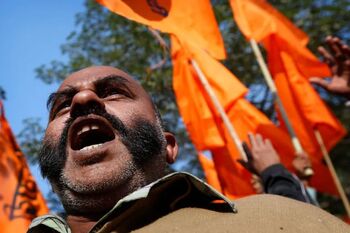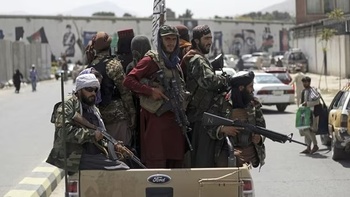Osman Softić ||9 May 2025
The Indian Overreaction
 However, the initial reactions of the Indian government have crossed the line of normalcy, and instead of pursuing the attackers, India is resorting to collective punishment of the innocent Kashmiri population, which has no connection to the crimes. Professor Ahmed argues that Indian authorities are using the same tactics, literally copying the methods Israel employs in brutally oppressing the Palestinians.
However, the initial reactions of the Indian government have crossed the line of normalcy, and instead of pursuing the attackers, India is resorting to collective punishment of the innocent Kashmiri population, which has no connection to the crimes. Professor Ahmed argues that Indian authorities are using the same tactics, literally copying the methods Israel employs in brutally oppressing the Palestinians.
The government in New Delhi is collectively punishing Kashmiri civilians, including through arbitrary arrests, the demolition of family homes of suspects, and gross violations of citizens’ human rights by the army and police. According to credible testimonies, over 1,500 Kashmiris have been arrested, many without proven links to the attack. The homes of families of political activists (suspected militants) and even ordinary critics of India’s occupation of Kashmir have been demolished, leaving entire families homeless. “What the Indian government is doing is not justice but collective punishment, which is illegal and immoral”, Zia wrote.
Kashmiri traditional religious leader Mirwaiz Umar Farooq, who, at the request of opposition politician Mehbooba Mufti, was allowed to lead communal prayers and deliver a sermon at the central mosque in Srinagar (the capital of Kashmir), unequivocally condemned the attack in Pahalgam. This religious and moral authority simultaneously called on Indian authorities to “not punish innocent Kashmiri families.” Mirwaiz appealed for justice to be based on fairness rather than collective vengeance against the entire Muslim community, which has suffered for decades under the torture of military occupation and political repression by New Delhi.
All political leaders in Kashmir, including former Chief Minister Mehbooba Mufti and parliamentarian Ruhullah Mehdi, have rightly criticized the government’s indiscriminate actions. Mehdi openly stated that Kashmir’s citizens are facing “collective punishment,” a terrifying reality reflected in home demolitions and extrajudicial killings confirmed by the families of innocent victims of repression.
For example, the father of suspected militant Shahid Ahmed Kutay poignantly asked, “Why was our house demolished?” when his son had long left the family home, and his whereabouts are unknown. In another case, the family of Altaf Lalji in Bandipora insists that the suspected militant was, in fact, an ordinary civilian but was killed in a deliberately staged clash with security forces.
The rise of Islamophobia
 While India mourns the victims of the Pahalgam attack, Islamophobic, anti-Muslim, anti-Kashmiri, and anti-Pakistani sentiment is sharply rising across the country. Kashmiri students are facing harassment, evictions, and threats. In some parts of India, Hindu right-wing groups have openly called on Kashmiri Muslims to leave or face retaliation. This dangerous situation not only threatens the violation of the basic rights of Kashmiri Muslims but also fuels a new cycle of hatred that perpetuates violence. Indian authorities, like the Israeli regime, deliberately downplay security failures that contributed to the tragedy in Pahalgam.
While India mourns the victims of the Pahalgam attack, Islamophobic, anti-Muslim, anti-Kashmiri, and anti-Pakistani sentiment is sharply rising across the country. Kashmiri students are facing harassment, evictions, and threats. In some parts of India, Hindu right-wing groups have openly called on Kashmiri Muslims to leave or face retaliation. This dangerous situation not only threatens the violation of the basic rights of Kashmiri Muslims but also fuels a new cycle of hatred that perpetuates violence. Indian authorities, like the Israeli regime, deliberately downplay security failures that contributed to the tragedy in Pahalgam.
The government’s decision to open the Baisaran Valley to tourists two months earlier than usual, without deploying security forces, facilitated the attackers’ execution of the terrorist act. Even some of India’s most liberal and enlightened opposition politicians, such as Shashi Tharoor, a parliamentarian from Kerala known for his principled criticism of Modi’s government and advocacy for a pluralistic, tolerant, and inclusive society, have rushed to justify the regime’s mistakes, comparing them to Israel’s failures on October 7, 2023. Tharoor described the negligence and carelessness of security services in failing to protect tourists as normal intelligence sector failures that occasionally happen to even the best security services in the world.
Amarjit Singh Dulat, former chief of India’s foreign intelligence agency, Research and Analysis Wing (R&AW), a prominent security expert on Kashmir, known for his critical stance toward the central government’s repressive measures in Kashmir, claims that this time the terrorists outsmarted his former agency. Dulat, who has written several books about his career and recently published a memoir titled “Chief Minister and the Spy”, caused unease in Kashmir. In his latest book, former Kashmir Chief Minister Farooq Abdullah is mentioned in a way that could compromise him as a politician among the people of Kashmir. Dulat, who maintained a long-standing friendship with Abdullah during his service in Kashmir, particularly during the height of conflicts between authorities and militants in the early 1990s, insinuates that Abdullah admitted he would have willingly agreed to the revocation of Kashmir’s autonomy and collaborated with the New Delhi regime to facilitate the abolition of Article 370, which stripped Kashmir of its autonomy, even though he publicly protested and was placed under house arrest during the 2019 crisis.
The Abdullahs, alongside the Mufti dynasty, are the most prominent political dynasty in Kashmir. Sheikh Abdullah, Farooq’s father, was the founder of the National Conference (NC) and a close associate of Jawaharlal Nehru. Farooq’s son, Omar, is the current chief minister of Jammu & Kashmir. Dulat claims he spoke favorably of Abdullah in the book, dedicating it to their long-standing friendship. Dulat insists he always advocated for a soft approach and dialogue with all political actors in Kashmir to de-escalate the situation and enable a freer flow of information from the ground about potential plans, intentions, and actions of militants and separatists. He complained that such information had dried up due to the lack of cooperation from Kashmiri citizens with the authorities and security services, which was frustrating for the Indian occupation regime in Kashmir.
In the absence of intelligence about real threats, the regime resorted to repressing innocent civilians out of desperation. The lack of cooperation from Kashmiris with the authorities and security services was so pronounced at one point that Dulat complained his agency was completely in the dark and knew nothing about the activities of militant separatists.
The Pakistani ‘complicity’
 Although Indian authorities have not yet provided any credible evidence that Pakistan is in any way responsible or involved in the terrorist attack in Pahalgam, Indian media, the government, and the public have already accused Pakistan of planning, aiding, and executing the crime. India claims to have located signals in Pakistan confirming the responsibility of the group known as “The Resistance Front” (TRF), which Indian authorities allege is a reincarnation of previously banned terrorist groups with Islamist affiliations, Lashkar-e-Taiba (LeT) and Jaish-e-Mohammed (JeM), operating from Pakistan and allegedly hiding under the guise of religious and humanitarian organizations under various names.
Although Indian authorities have not yet provided any credible evidence that Pakistan is in any way responsible or involved in the terrorist attack in Pahalgam, Indian media, the government, and the public have already accused Pakistan of planning, aiding, and executing the crime. India claims to have located signals in Pakistan confirming the responsibility of the group known as “The Resistance Front” (TRF), which Indian authorities allege is a reincarnation of previously banned terrorist groups with Islamist affiliations, Lashkar-e-Taiba (LeT) and Jaish-e-Mohammed (JeM), operating from Pakistan and allegedly hiding under the guise of religious and humanitarian organizations under various names.
India has also accused elements of the so-called Pakistani deep state, specifically the military intelligence agency the Inter-Services Intelligence (ISI), of creating, training, and providing protection to these alleged terrorist groups. Based on these accusations, India has launched a series of measures against Pakistan and its citizens. One of the most dramatic announced measures is the threat to suspend an international water supply agreement, which India lacks the capacity or ability to enforce, at least not in the next few years. Pakistan has responded with countermeasures.
Since the current commander-in-chief of the Pakistani armed forces, General Asim Munir, was previously the head of the military intelligence agency (ISI), India has attributed responsibility for the terrorist attack in Pahalgam to this Pakistani general, for several reasons. Indian media have accused Pakistan’s army chief of staff, Asim Munir, of being an “Islamist extremist “due to his frequent references to the two-nation theory and the alleged claims on his part of the incompatibility of Muslims living with Hindus. Indian media claims his views are repellent to all Indians, regardless of their religious affiliation, since religion cannot define nationalism.
Hence, the policy of Narendra Modi’s government, based on the ideology of Hindutva, is sometimes criticized in India as an attempt to “pakistanize” Indian political discourse. Of course, the Indian public, media, and influential commentators overlook the fact that the very things they accuse Asim Munir of having said, have been implemented by Narendra Modi’s government in India for a decade now. Muslims in India are the primary victims of such ideology and policies.
On April 16, 2025, general Munir delivered a sharp speech at a meeting with representatives of the Pakistani diaspora community, in which he spoke of the necessity of “Muslim unity” and “strengthening Pakistan’s Islamic identity,” particularly in light of secessionist threats from Pashtun and Baloch separatist armed terrorist groups in Pakistan’s provinces of Balochistan and Khyber Pakhtunkhwa, which, from the perspective of the Pakistani government, are working together to undermine Pakistan’s territorial integrity. Moreover, Pakistani authorities claim that India has been covertly supporting both separatist movements in Pakistan to destabilize and disintegrate the Pakistani state.
The latest terrorist attack in Pakistan’s Balochistan was the hijacking of the Jaffer Express passenger train, carried out by the Balochistan Liberation Army (BLA), a militant separatist group operating in the restive and mineral-rich province of Balochistan. The BLA killed 27 hostages and one soldier. In the clash between the army and the BLA during a rescue operation, 35 militants were killed. The train was traveling from Quetta to Peshawar in northern Pakistan, and the militants opened fire as the train passed through a tunnel at the start of its journey. Pakistani authorities claim that India is deeply involved in this terrorist attack in Balochistan, while in India, there is a prevailing belief that the terrorist attack in Pahalgam could be a form of Pakistani retaliation for the crimes committed in Balochistan against the passengers of the Jaffar Express.
 Osman Softić is a Research Fellow at the Islamic Renaissance Front. He holds a BA degree in Islamic Studies from the Faculty of Islamic Studies of the University of Sarajevo and has a Master degree in International Relations from the University of New South Wales (UNSW). He contributed commentaries on Middle Eastern and Islamic Affairs for the web portal Al Jazeera Balkans, Online Opinion, Engage and Open Democracy. Osman holds dual Bosnian and Australian citizenship.
Osman Softić is a Research Fellow at the Islamic Renaissance Front. He holds a BA degree in Islamic Studies from the Faculty of Islamic Studies of the University of Sarajevo and has a Master degree in International Relations from the University of New South Wales (UNSW). He contributed commentaries on Middle Eastern and Islamic Affairs for the web portal Al Jazeera Balkans, Online Opinion, Engage and Open Democracy. Osman holds dual Bosnian and Australian citizenship.

